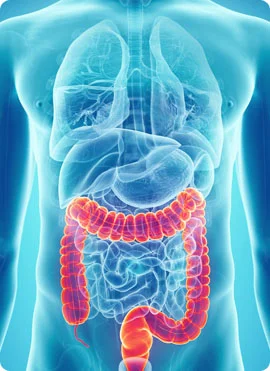Ulcerative
Colitis
 What is Ulcerative Colitis?
What is Ulcerative Colitis?
Ulcerative colitis, an inflammatory bowel disease, causes inflammation (swelling) and sores (called ulcers) in the large intestine, the colon and rectum.
Ulcerative colitis can happen at any age, but it is more likely to develop in people between the ages of 15 and 30, or older than 60 years of age. Ulcerative colitis needs to be diagnosed by a health care provider. While there are no cures, there are treatments.
Symptoms
Ulcerative colitis may start slowly and get worse for many weeks. It can have times of remission or mildly, moderately or severely active. It can be described as fulminant, which means that it is severely active and not responding to therapy.
Most symptoms of ulcerative colitis relate to bowel movements. But, the symptoms of ulcerative colitis can vary from person to person, based on where the disease is in the body and how bad the inflammation is. The most common symptoms of ulcerative colitis are:
- Diarrhea (loose stool), which is often the first symptom.
- Blood in the stool.
- Urgency, or immediate need, to go to the bathroom.
- Increased number of bowel movements.
- Belly pain and cramping.
You might have weight loss or other symptoms that affect the entire body. The inflammation of ulcerative colitis can also affect your joints or skin, leading to painful joints and skin rashes. During a flare-up, symptoms may go beyond those that affect the digestive system, including:
- Rashes or patches of red, swollen skin.
- Painful or swollen joints.
- Mouth ulcers.
- Red, irritated eyes.
Keep of track of any symptoms, how often you have them and how bad they are to talk about with your health care provider.
Complications of ulcerative colitis
Taking your medicine and staying well hydrated and nourished can help keep ulcerative colitis under control. Sometimes, though, complications can happen. Often, with ulcerative colitis, these issues will need medical attention.
Rectal bleeding
Ulcers in the intestinal lining can open and bleed.
Bleeding can cause anemia, which can be treated with diet changes and iron supplements. If you have a large amount of bleeding in your intestine over a short period of time, you may require surgery to stop the bleeding. Severe bleeding is a rare complication of ulcerative colitis.
Dehydration and malabsorption
This happens when the large intestine is unable to absorb fluids and nutrients because of diarrhea and inflammation. You might need intravenous (IV, into your vein) fluids to replace lost nutrients and fluids.
Changes in bones
Some corticosteroid medications taken to treat ulcerative colitis symptoms can cause:
- Osteoporosis—the loss of bone
- Osteopenia—low bone density
Inflammation, or swelling, in other areas of your body
Your immune system can trigger inflammation in your:
- Joints
- Eyes
- Skin
- Liver
Your health care provider can treat inflammation by adjusting medications or prescribing new medications.
Megacolon
A serious complication that occurs when inflammation spreads to the deep tissue layers of the large intestine. The large intestine swells and stops working, it can be a life-threatening complication and most often requires surgery. It is a rare complication of ulcerative colitis.
Getting tested for ulcerative colitis
There are many tests your gastroenterologist can do to find out if you have ulcerative colitis.
Blood tests
Your doctor will look for anemia (low iron in your blood, which can make you feel weak and tired), caused by bleeding. Blood tests can show signs of inflammation or infection somewhere in the body, like a high white blood cell count and other markers of inflammation. Blood tests can be done at your doctor’s office or in a lab.
Stool tests
Stool tests are done to make sure there aren’t other gastrointestinal health problems, such as infection, causing symptoms. Stool tests can show if there is bleeding in the intestines and may confirm if inflammation is present.
Colonoscopy
A colonoscopy involves looking at the colon to view your whole colon and rectum for inflammation, swollen tissue, ulcers or polyps. If the doctor thinks it might be ulcerative colitis, he or she will also do a biopsy during the colonoscopy. This is not something you will be able to feel.
Flexible sigmoidoscopy
Sigmoidoscopy is a test to check the rectum and the lower end of the colon for polyps and cancer. Only the final two feet of the colon’s six feet are examined and the doctor may take a biopsy during the test.
